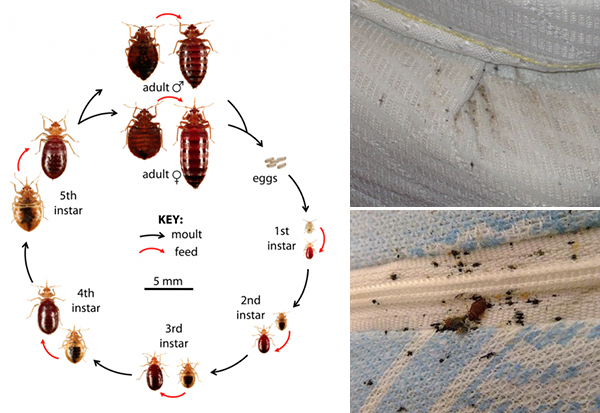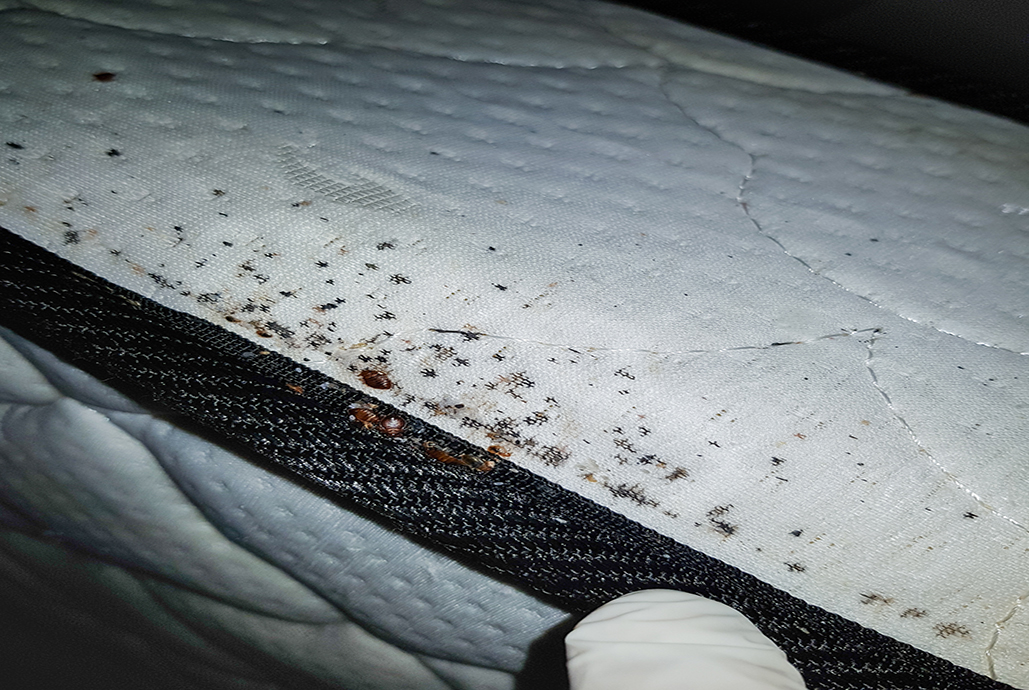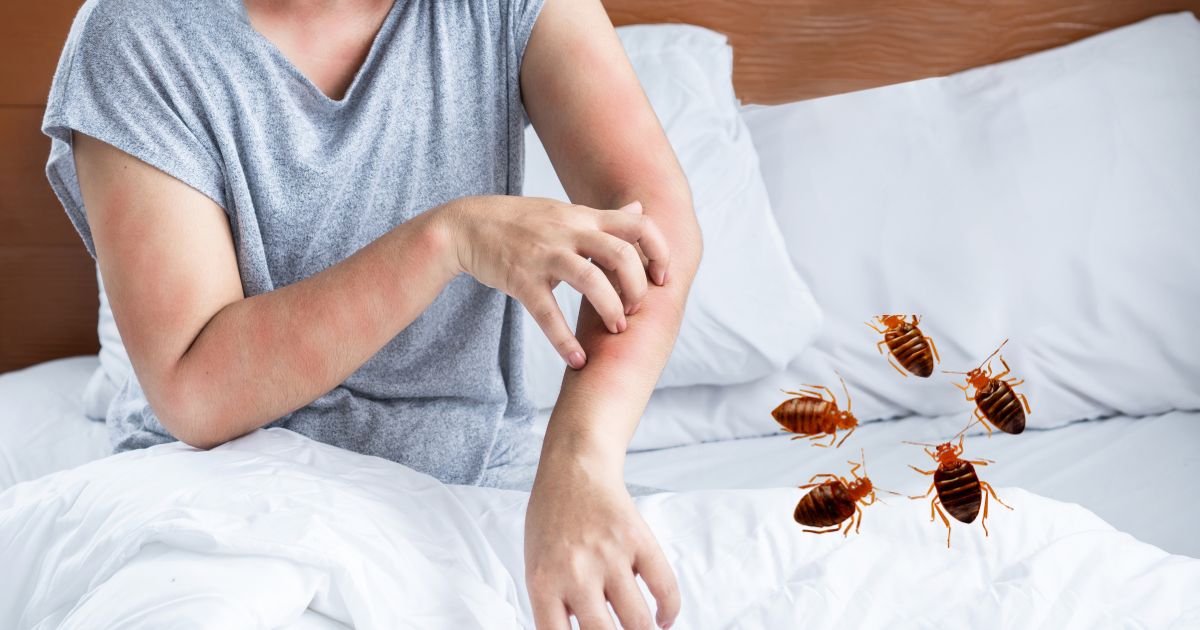To protect yourself from bed bugs, regularly inspect your bedding, furniture, and luggage. Use protective mattress and pillow covers and vacuum regularly.
Dealing with the pesky problem of bed bugs can be a real nightmare. These tiny blood-sucking pests have a knack for infesting our living spaces, causing itchy bites and sleepless nights. But fear not, as there are effective ways to protect yourself from these unwanted guests.
From inspecting your bedding and luggage to using protective covers and practicing good hygiene, there are proactive measures you can take to keep bed bugs at bay. In this guide, we will explore some simple yet effective strategies to help you protect yourself from bed bugs and maintain a peaceful, bug-free environment. Let’s delve into the essential tips and tricks for safeguarding yourself and your home from these resilient pests.

Credit: www.domyown.com
Identifying Bed Bugs
Physical Appearance
- Small, oval-shaped insects<li
- Flat bodies, reddish-brown color
- About the size of an apple seed
Bite Marks
- Red, raised bumps on the skin
- Usually in rows or clusters
- Itchy and may cause allergic reactions
Signs Of Infestation
- Dark spots on bedding and furniture
- Musty odor near the bed
- Blood stains on sheets or pajamas
Preventing Bed Bug Infestation
Protect yourself from potential bed bug infestations by following these simple steps:
Inspecting Secondhand Furniture
- Inspect any secondhand furniture thoroughly before bringing it inside.
- Look for signs of bed bugs, such as dark spots or shed skins.
- If you suspect bed bugs, avoid bringing the item home.
Using Protective Covers
- Use protective covers on mattresses and box springs to prevent bed bugs.
- Ensure the covers are zippered and fully sealed.
- Regularly inspect covers for tears or rips.
Securing Luggage While Traveling
- Keep your luggage off the floor and beds in hotels.
- Use luggage racks or luggage stands to prevent bed bug transfers.
- Inspect your luggage after traveling and wash clothes in hot water.
Cleaning And Decluttering
Cleaning and decluttering your living space is an essential step in protecting yourself from bed bugs. Regular vacuuming, washing and drying bedding, and reducing clutter are effective ways to prevent bed bugs from infesting your home. In this section, we will explore each of these strategies in detail to help you keep those pesky pests at bay.
Regular Vacuuming
Vacuuming your home regularly is key to preventing bed bugs from taking up residence. Make sure to focus on areas where bed bugs are likely to hide, such as mattresses, box springs, and upholstered furniture. Remember to use the crevice tool to get into those hard-to-reach corners and crevices. After vacuuming, seal the vacuum bag in a plastic bag and dispose of it outside your home to ensure any captured bed bugs are safely removed.
Washing And Drying Bedding
Another important step in combating bed bugs is to regularly wash and dry your bedding. Bed bugs cannot survive extreme temperatures, so washing your sheets, pillowcases, and blankets in hot water (at least 120°F) is crucial. Be sure to dry them on high heat as well for at least 30 minutes to eliminate any remaining bed bugs. Consider using mattress and pillow protectors that are designed to prevent bed bugs from infesting your bedding.
Reducing Clutter
Decluttering your living space not only helps eliminate potential hiding spots for bed bugs but also makes it easier to spot and treat any infestations. Start by organizing and removing unnecessary items from your home. Use sealed plastic storage containers to store belongings, as they are more bed bug resistant than cardboard boxes. Focus on bedrooms, living rooms, and other areas where you spend a lot of time. Remember, the less clutter, the fewer places bed bugs have to hide.
By incorporating these cleaning and decluttering strategies into your routine, you can greatly reduce the chances of a bed bug infestation in your home. Stay vigilant and proactive in your efforts to protect yourself and your family from these unwanted pests.
Treating Infested Areas
When it comes to treating infested areas for bed bugs, it’s crucial to take rigorous measures to eliminate these pesky pests effectively. Here are the best methods to handle a bed bug infestation:
Hiring Professional Exterminators
If the bed bug infestation is severe, hiring professional exterminators is the most efficient way to eliminate these pests. Professional exterminators have the expertise, tools, and high-grade pesticides necessary to eradicate bed bugs from your home successfully.
Using Diy Methods
For minor infestations, you can employ DIY methods to treat affected areas. Vacuuming and applying chemical sprays approved for bed bugs are effective in reducing their population.
Protecting The Bedroom
Protecting your sleeping space from bed bugs is crucial for a good night’s rest and to prevent an infestation. Taking proactive measures can help ensure a bed bug-free environment.
Isolating The Bed
Use bed bug-proof encasements on your mattress and box spring to prevent bed bugs from establishing themselves in these areas. Additionally, place bed bug interceptor traps under the legs of your bed to catch and monitor any potential bed bug activity.
Using Bed Bug Detectors
Consider using bed bug detectors such as active monitors or CO2 traps to monitor bed bug activity in the bedroom. These detectors can help catch bed bugs early on and prevent a full infestation.
Sealing Cracks And Crevices
Ensure to thoroughly seal any cracks or crevices in the bedroom, including baseboards, electrical outlets, and any other potential entry points for bed bugs. A caulking gun can be useful in sealing these areas effectively.
Credit: www.businessinsider.com
Traveling And Bed Bug Prevention
When it comes to traveling, one of the last things you want to bring back with you is a hitchhiking bed bug. These tiny pests can easily infest hotels, hostels, and even transportation. However, with a few simple precautions, you can protect yourself from these unwelcome travel companions. In this post, we will explore some effective strategies for preventing bed bugs while traveling.
Inspecting Hotel Rooms
Before settling into your hotel room, take a few minutes to inspect the space for any signs of bed bugs. Look closely at the seams and crevices of the mattress, sheets, and furniture. Keep an eye out for dark stains, tiny eggs, or shed skins, which are telltale signs of infestation. Additionally, you can use a flashlight to check behind the headboard or in the cracks of the walls. If you notice any signs of bed bugs, don’t hesitate to ask for a different room or switch accommodations altogether.
Keeping Luggage Off The Floor
Bed bugs often hide in carpets, rugs, or upholstered furniture, so keeping your luggage off the floor is crucial. Utilize the luggage rack or place your suitcase on a hard surface, such as a table or dresser. By elevating your luggage, you reduce the chances of bed bugs crawling into your bags and hitching a ride back home with you. It’s also a good idea to keep your belongings organized and sealed in plastic bags to create an extra layer of protection.
Washing Clothes Immediately
Once you return from your trip, it’s essential to wash your clothes and belongings as soon as possible. Set your laundry to the hottest temperature recommended for the specific fabrics to eliminate any potential bed bugs that might have stowed away. It’s important to note that store-bought insecticides are not effective on bed bugs, so washing with hot water and drying on high heat is the best way to ensure their removal.
Dealing With Bed Bug Bites
Bed bug bites can be uncomfortable and itchy. It’s essential to resist the urge to scratch them to prevent further irritation.
Avoid Scratching
- Keep your nails trimmed short to reduce the risk of breaking the skin while scratching.
- Apply a cold compress to the affected area to alleviate itching and reduce swelling.
Using Anti-itch Creams
- Choose an over-the-counter antihistamine cream to alleviate itching and reduce redness.
- Consult a pharmacist for recommendations on the most effective anti-itch creams.
Consulting A Healthcare Professional
If symptoms persist or worsen, seek medical advice promptly. A healthcare professional can provide proper treatment to address severe reactions to bed bug bites.
Educating Others And Raising Awareness
When it comes to protecting yourself from bed bugs, educating others and raising awareness is crucial. By sharing information with friends and family, informing your workplace or school, and supporting community initiatives, you can help prevent the spread of bed bugs. Let’s delve into the actionable steps under each category.
Sharing Information With Friends And Family
- Explain the signs of a bed bug infestation.
- Teach them how to inspect their belongings.
- Share prevention tips to keep bed bugs at bay.
Informing Your Workplace Or School
- Report any suspected bed bug activity promptly.
- Advise on proper handling of shared spaces.
- Request professional inspection if necessary.
Supporting Community Initiatives
| Actions | Benefits |
|---|---|
| Participate in local awareness campaigns. | Spread knowledge and prevention strategies. |
| Volunteer for community clean-up efforts. | Reduce potential bed bug habitats. |

Credit: hotelbusiness.com
Frequently Asked Questions For How To Protect Myself From Bed Bugs?
What Are The Signs Of A Bed Bug Infestation?
Bed bug infestations can be identified by itchy welts on the skin, small blood stains on sheets, and a musty odor in the room. Check for live bugs, eggs, or shed skins in mattress seams and furniture to confirm an infestation.
How Can I Prevent Bringing Bed Bugs Home?
To prevent bringing bed bugs home, inspect any used furniture or clothing carefully before bringing them into your home. When traveling, inspect hotel rooms for signs of bed bugs and keep luggage off the floor and bed.
What Are Effective Ways To Get Rid Of Bed Bugs?
Effective ways to get rid of bed bugs include thorough cleaning, vacuuming, steam treatment, and using bed bug insecticides. Hiring a professional pest control service may also be necessary for severe infestations.
Can Bed Bugs Transmit Diseases To Humans?
Bed bugs are not known to transmit diseases to humans. While their bites can cause allergic reactions and discomfort, they are not vectors of infectious diseases like mosquitoes or ticks.
Conclusion
Protecting yourself from bed bugs is crucial to ensure a peaceful and bug-free sleep environment. By following the preventive measures mentioned earlier, such as frequent cleaning, sealing cracks, and washing bed linens regularly, you can reduce the risk of bed bug infestations.
Remember, early detection and timely action play a vital role in preventing infestations from spreading. Stay vigilant and take necessary steps to keep those bed bugs at bay. Sleep tight, knowing that you have taken the necessary precautions to protect yourself from these pesky pests.
Related posts:

I’m MD Tanvir, and I bring years of expertise gained from working closely with pest control companies to the forefront. My journey in the industry has inspired me to launch Bug Battler, a platform aimed at equipping people with the know-how to combat pests autonomously. Through Bug Battler, I aim to empower individuals with practical insights to tackle pest infestations effectively.

